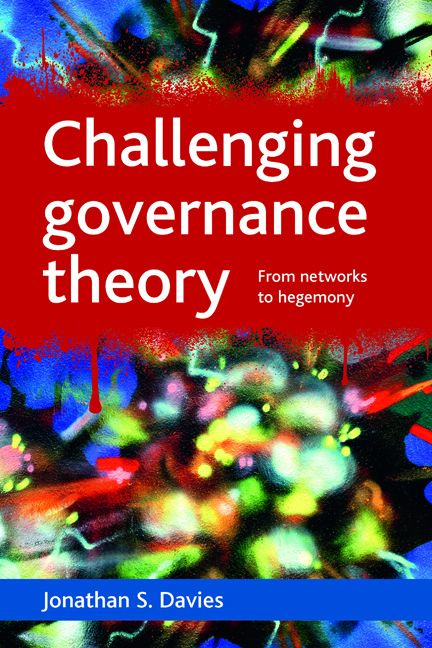Book contents
- Frontmatter
- Dedication
- Contents
- List of tables
- Preface
- Introduction
- one The network governance milieu
- two Network governance policy
- three The limits of network governance
- four Beyond the transformation thesis
- five From network governance to hegemony
- six Gramscian governance research
- seven Conclusion
- References
three - The limits of network governance
Published online by Cambridge University Press: 07 September 2022
- Frontmatter
- Dedication
- Contents
- List of tables
- Preface
- Introduction
- one The network governance milieu
- two Network governance policy
- three The limits of network governance
- four Beyond the transformation thesis
- five From network governance to hegemony
- six Gramscian governance research
- seven Conclusion
- References
Summary
Introduction
Chapter Two suggested that there is little direct empirical evidence pointing to the emergence of authentic connectionist practices. On the contrary, much of the literature highlights barriers to this outcome. This chapter explores key themes in the critical literatures, highlighting the empirical basis for a critique of network governance theory: that it misreads both past and present, that governance networks are prone to resolving into hierarchies and incremental closure, that they reproduce inequalities, and that distrust is common. Consequently, there is a pronounced tendency for governance networks to re-enact the practices they are meant to complement or displace. The final part of the chapter considers a theoretical critique of network governance from within the post-traditional worldview, the Foucauldian view of networking as fostering neoliberal governmentalities. The chapter concludes that Foucauldian research shines a powerful lens on the limits of post-hegemonic theory but that it needs resituating in the political economy of network governance, which is developed in Chapters Four and Five.
Governance networks in the 20th century
Nickel (2009, p 383) observes that ‘celebrations of transformation abound’ in public administration. One immediate problem with the transformation thesis is the way it celebrates the novelty of the present by distorting the past (Lynn, 2001). Interdependence between governmental and non-governmental actors is axiomatic to governing systems, however remote and hierarchical they may appear to be. More specifically, the kinds of governance institution heralded today as transformative have been woven into the fabric of state–citizen relations at least since the rise of universal suffrage. Certainly, the preoccupations of scholars writing near the beginning of the 20th century are familiar.
Fairlie (1926), for example, explored the emergence and proliferation of the Public Advisory Committee in British public administration at the end of the 19th century and particularly after the First World War. He argued that such committees should reflect the different interests affected and be consulted on matters of policy, although they ought not to supersede ministerial decision-making. At the end of the Second World War, White (1945, p 142) noted that ‘the inclusion of so-called public representatives is an old custom’, arguing that civil servants should be sensitive to the voice of public service users to ‘humanize the bureaucracy’.
Information
- Type
- Chapter
- Information
- Challenging Governance TheoryFrom Networks to Hegemony, pp. 55 - 74Publisher: Bristol University PressPrint publication year: 2011
